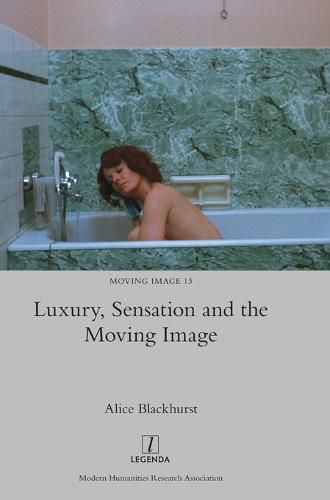Readings Newsletter
Become a Readings Member to make your shopping experience even easier.
Sign in or sign up for free!
You’re not far away from qualifying for FREE standard shipping within Australia
You’ve qualified for FREE standard shipping within Australia
The cart is loading…






This title is printed to order. This book may have been self-published. If so, we cannot guarantee the quality of the content. In the main most books will have gone through the editing process however some may not. We therefore suggest that you be aware of this before ordering this book. If in doubt check either the author or publisher’s details as we are unable to accept any returns unless they are faulty. Please contact us if you have any questions.
In recent years, the embrace of ‘slow;’ sensuous and durational forms of cinema and the moving image registers desires to immerse in phenomenological experiences of artworks as potential antidotes to our information-saturated, techno-capitalist age. Exploring shifts away from ownership, accumulation and possessive acquisition of the object towards more experiential, immaterial ‘aneconomies’ of pleasure, care, eroticism, poetry and ritual, this book tracks the evolution in understandings of the luxurious in the last decade, and luxury’s potential coalitions with cinephilia; affect; the senses and the ontology and formal quality of light (lux, lucis). Engaging with four contemporary Francophone women artists - Louise Bourgeois, Chantal Akerman, Sophie Calle and Annie Ernaux - as case studies for an inter-medial, multi-sensory, and generically ‘queer’ conception of le luxe - the book also queries luxury’s entrenched gendering as pathologized symptom of feminized experience; and both luxury and femininity’s relation to consumption; embodiment and excess under neoliberal austerity and 24/7 surveillance culture. Although in our current disaster-laden epoch, sustained thinking about luxury might appear a perverse and abstracted act, the book, via the medium of cinema and the moving image, argues that a different understanding of luxury as a ‘sensuous relation to the world;’ a slowing down of critical and attentive faculties; and a re-investment in affective acts of communal being-together may no longer be decadent but epistemologically necessary to the preservation and continued affirmation of this world.
Alice Blackhurst is an Ordinary Fellow in French at King’s College, Cambridge.
$9.00 standard shipping within Australia
FREE standard shipping within Australia for orders over $100.00
Express & International shipping calculated at checkout
This title is printed to order. This book may have been self-published. If so, we cannot guarantee the quality of the content. In the main most books will have gone through the editing process however some may not. We therefore suggest that you be aware of this before ordering this book. If in doubt check either the author or publisher’s details as we are unable to accept any returns unless they are faulty. Please contact us if you have any questions.
In recent years, the embrace of ‘slow;’ sensuous and durational forms of cinema and the moving image registers desires to immerse in phenomenological experiences of artworks as potential antidotes to our information-saturated, techno-capitalist age. Exploring shifts away from ownership, accumulation and possessive acquisition of the object towards more experiential, immaterial ‘aneconomies’ of pleasure, care, eroticism, poetry and ritual, this book tracks the evolution in understandings of the luxurious in the last decade, and luxury’s potential coalitions with cinephilia; affect; the senses and the ontology and formal quality of light (lux, lucis). Engaging with four contemporary Francophone women artists - Louise Bourgeois, Chantal Akerman, Sophie Calle and Annie Ernaux - as case studies for an inter-medial, multi-sensory, and generically ‘queer’ conception of le luxe - the book also queries luxury’s entrenched gendering as pathologized symptom of feminized experience; and both luxury and femininity’s relation to consumption; embodiment and excess under neoliberal austerity and 24/7 surveillance culture. Although in our current disaster-laden epoch, sustained thinking about luxury might appear a perverse and abstracted act, the book, via the medium of cinema and the moving image, argues that a different understanding of luxury as a ‘sensuous relation to the world;’ a slowing down of critical and attentive faculties; and a re-investment in affective acts of communal being-together may no longer be decadent but epistemologically necessary to the preservation and continued affirmation of this world.
Alice Blackhurst is an Ordinary Fellow in French at King’s College, Cambridge.